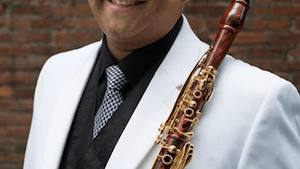Music for a movie we'll never see
Chamber Orchestra of Philadelphia: Mozart, Gluck,'Dances of the Blessed Spirit'

Last month the Chamber Orchestra of Philadelphia premiered a violin concerto that depicted an ancient Chinese battle. For their November concert, they finished with a piece that may be one of the fiercest comments on war any creative artist has ever produced.
Write what you know
Malcolm Arnold was a British composer who wrote over one hundred film scores, including the Oscar-winning music for The Bridge on the River Kwai. He was a conscientious objector but he volunteered for military service when his brother was killed in 1943. The army put him in a band and he decided he didn’t want to compromise his principles just so he could march around playing military music. So he shot himself in the foot and returned to civilian life.
His 1946 Symphony for Strings can be heard as an expression of intense psychological turmoil fueled by problems that included alcoholism and bipolar disorder. But you can also hear it as a reaction to the war and his wartime experiences. To me, it plays like the sound track for a World War II movie that’s a hundred times more savage than any war movie anyone has actually produced. The first movement is harsh, jagged, and chaotic; the second is softer, with a hint of melody, but eventually it, too, becomes chaotic; and the final third movement is a storm of emotions with an ominous plucked bass playing in the background.
Lively performance
However you look at the Symphony for Strings, it made a powerful finish for a program preceded by three notably mellower entries. The big event on the first half was Mozart’s clarinet concerto, with the Philadelphia Orchestra’s principal clarinet, Ricardo Morales, as guest soloist. Mozart put some of his best orchestral writing into his wind concertos and the clarinet concerto sometimes sounds like a contest between a soloist who’s determined to show his stuff and an orchestra that refuses to be a mere accompaniment. The result in this case was a polished, exceptionally lively performance.
The other item on the first half was a serene, pastoral Dance of the Blessed Spirits from Gluck’s 1762 version of Orfe and Eurydice. The big surprise on the program, for me, was the second half opener, the third suite in Respighi’s Ancient Airs and Dances. For most of us, Respighi’s output consists of his orchestral odes to the pines and fountains of Rome. This suite of Renaissance and Baroque dances proved there’s more to him than that. Respighi didn’t try to create an archaic atmosphere or reproduce the sounds of Baroque instruments. He clothed the old music in the sounds of modern instruments and created something unique.
Australian conductor Kynan Johns led the proceedings with a relaxed, unobtrusively dignified air that suited the program. He seemed to have a natural rapport with the orchestra — a virtue that’s a big plus when an orchestra includes musicians who have frequently proved they can operate without a conductor, Baroque style. Johns is currently the director of orchestras at Rutgers University, so we may see more of him in the future.
What, When, Where
Chamber Orchestra of Philadelphia, Mozart, Gluck, and Dances of the Blessed Spirits. Kynan Johns, conductor. Ricardo Morales, clarinet. Gluck, Dance of the Blessed Spirits from Orfeo ed Euridice. Mozart, Clarinet Concerto. Respighi, Ancient Airs and Dances. Arnold, Symphony for Strings. November 6, 2016 at the Kimmel Center, Perelman Theater, 300 S. Broad St., Philadelphia. (215) 545-1739 or chamberorchestra.org.
Sign up for our newsletter
All of the week's new articles, all in one place. Sign up for the free weekly BSR newsletters, and don't miss a conversation.

 Tom Purdom
Tom Purdom